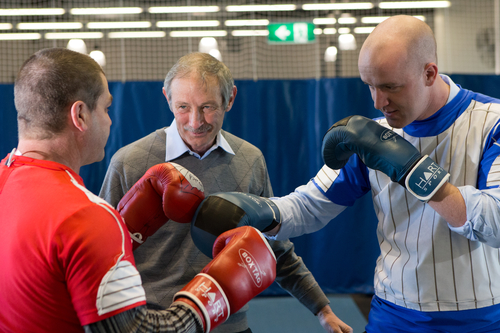Ed O'Daly
27 January 2015: Boxing is a sport that divides people. In one corner are the devotees who see it as the sport of kings, a noble and beautiful pursuit that instills physical and mental discipline in its competitors. In the other are those who see it as brutal, barbaric – and who certainly wouldn't want their children subjected to the risk of serious injury when there are safer sports out there.
There doesn't appear to be much room for compromise, but University of Canberra sports scientist Allan Hahn is close to one.
He's part of a team that has invented Box'Tag, a new sport that requires the skill of a boxer, but without the risk of injury. There are no blows to the head or neck and a points system that removes the incentive to hit hard – with competitors wearing gloves and pads with sensors – but there are still a few arduous rounds for Professor Hahn and his team before Box'Tag becomes mainstream.
"The project is important because it has the potential to give a well-established but controversial sport a new dimension aimed at protecting participants from harm. From a broader perspective, it is demonstrating the scope for technology to have transformational effects on sport," he says.
"In essence, the project is a major exercise in sport design. At the highest level, it entails the design of a new sport, but this is underpinned by the design also of specialised equipment and infrastructure needed to make the sport viable."
The former Australian Institute of Sport (AIS) chief scientist says building a sport almost from scratch is not a simple process, with the technology being tested at a number of pilot sites, including at the Canberra Police Community Youth Club in the suburb of Erindale where former AIS and national boxing coach and University of Canberra master's student Paul Perkins leads the program.
The technical side involves special sensor vests that automatically keep score, with new impact-absorbing gloves under development.

|
UC's Allan Hahn is part of a team that has invented a new form of boxing that limits injuries. Photo: Katherine Griffiths. |
The challenge is not just technological. To encourage take up, the sport needs to be affordable. The average club can't necessarily afford the high-tech equipment required, so Professor Hahn is working on a simplified set-up and also examining whether the sport should be rolled out as a commercial or not-for-profit enterprise.
Then there are the unintended consequences in creating a new sport. Early participants attempted to game the scoring system with inelegant low skill, high energy assaults on the target areas. Professor Hahn is working on addressing this with a "bout quality index" that adjusts scores based on technical proficiency.
"Box'Tag is not just boxing without head impacts, but is instead intended to have a much more game-like character," Professor Hahn says.
A few people from within the conventional boxing community have criticised Box'Tag for its removal of dependence on the toughness, physical assertion and high-adrenalin risk-taking that they see as fundamental elements of boxing.
"There are undoubtedly sociological complexities that remain to be fully understood. It has been argued that, in many disadvantaged communities, young males may see participation in boxing as an initiation into manhood. It is unlikely that they could come to regard Box'Tag in that way," Professor Hahn says.
And it's in these "sociological complexities" that the exponents of Box'Tag really have a fight on their hands. It's not just the reality of boxing they have to compete with: there's also the legend.
Professor Hahn says there is little evidence to support the romanticised view of boxing as a sport that gives working class kids a leg up. While some programs successfully link boxing to beneficial compulsory participation in social and educational activities, in the average gym youngsters can "have a quite transient and ultimately painful experience of the sport".
"The boxing industry is basically exclusive – it's very much geared toward finding champions, with other participants typically falling by the wayside. There are quite a few casualties for every success story.
"To me, it would seem much better if we could attract working class kids to an intrinsically inclusive form of the sport that would provide for long-term involvement and a sustained educational opportunity, while also minimising their exposure to injury. Box'Tag could be ideally suited to social outreach."


